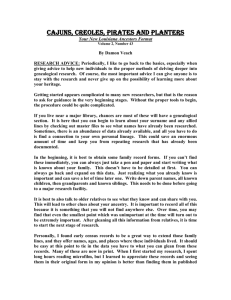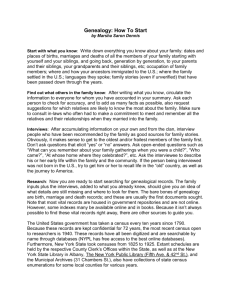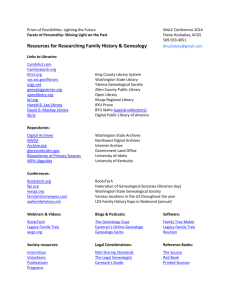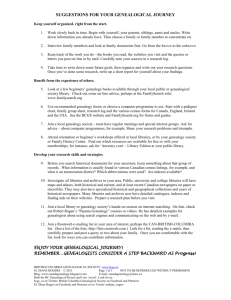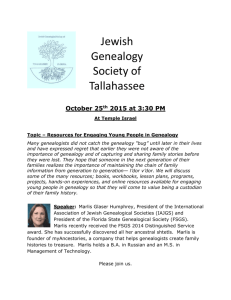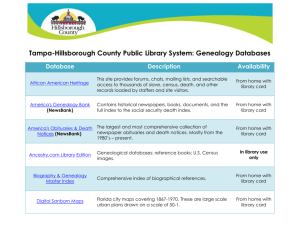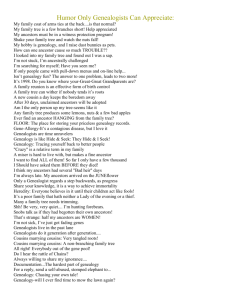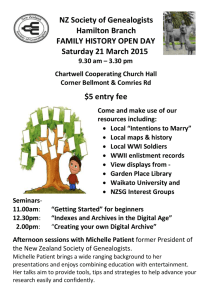History and Genealogy—Why Not Both
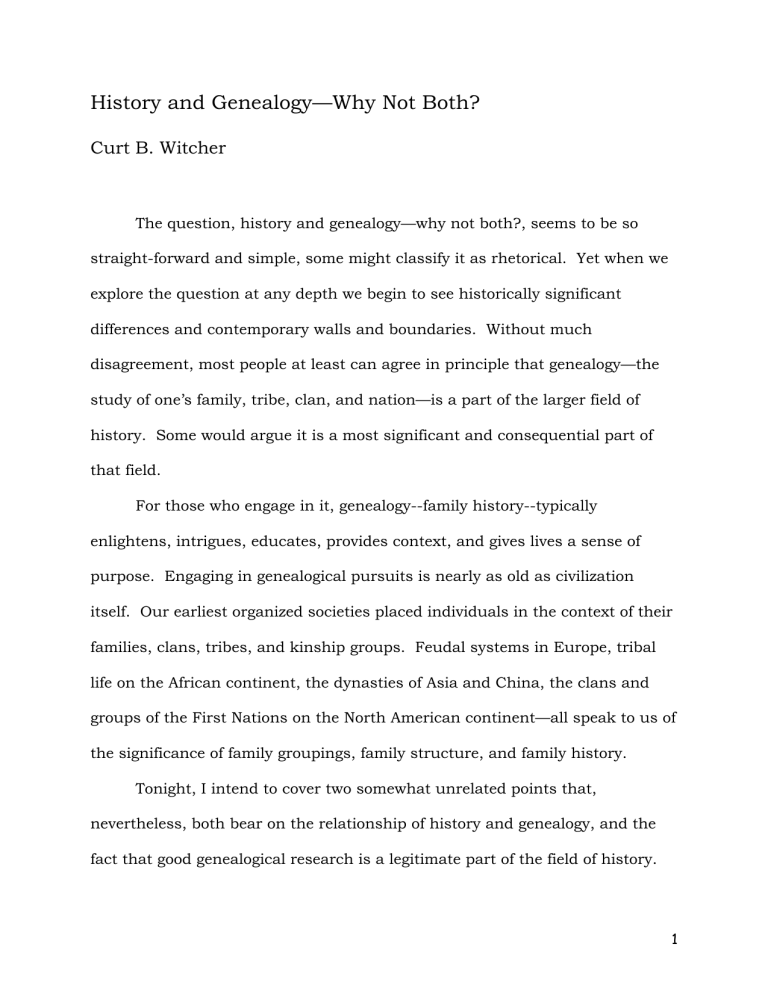
History and Genealogy—Why Not Both?
Curt B. Witcher
The question, history and genealogy—why not both?, seems to be so straight-forward and simple, some might classify it as rhetorical. Yet when we explore the question at any depth we begin to see historically significant differences and contemporary walls and boundaries. Without much disagreement, most people at least can agree in principle that genealogy—the study of one’s family, tribe, clan, and nation—is a part of the larger field of history. Some would argue it is a most significant and consequential part of that field.
For those who engage in it, genealogy--family history--typically enlightens, intrigues, educates, provides context, and gives lives a sense of purpose. Engaging in genealogical pursuits is nearly as old as civilization itself. Our earliest organized societies placed individuals in the context of their families, clans, tribes, and kinship groups. Feudal systems in Europe, tribal life on the African continent, the dynasties of Asia and China, the clans and groups of the First Nations on the North American continent—all speak to us of the significance of family groupings, family structure, and family history.
Tonight, I intend to cover two somewhat unrelated points that, nevertheless, both bear on the relationship of history and genealogy, and the fact that good genealogical research is a legitimate part of the field of history.
1
First, while all of the root causes may be unclear and debatable, we are failing in how we allow history to be taught, or rather to not be taught, in many
K-12 classrooms across America. There are severe, negative consequences in allowing this to continue. The incorporation of genealogical studies into the curricula would enhance student interest, improve the learning environment, and raise the level of appreciation for the importance of history—local, regional, and national—in our lives.
Second, genealogists should generate hypotheses, gather evidence, and evaluate research in the most robust historical contexts possible. As such, genealogists cannot be successful if they look at history as something “outside” of the pursuits in which they are engaged. Their research is best validated and confirmed when plugged into the history of the locales and time periods in which they have located their ancestors. Historians have much to offer genealogists in properly and fully contextualizing their research. Genealogists must avail themselves of the work of historians, and historians must make themselves available to genealogists.
We Are Failing Our Future
Outstanding history instructors and professors exist across the American landscape, and I trust there will be many in the future to positively impact our children’s children. Done well, teaching in the K-12 arena is among the most challenging professions. Done poorly, teaching in the K-12 arena can have devastating effects that last beyond one’s lifetime.
2
The state of history education in K-12 classrooms throughout America is cause for alarm. The reasons include an overemphasis on vocational, jobbased education that seemed to dominate the late 1980s and the 1990s.
Education for the sake of creating mature, thinking, responsible, participating members of society was devalued in favor of equipping individuals as early as possible with the requisite skills to engage in a particular profession or specific occupation.
We are failing our children if we do not move to correct the situation. For those who may not perceive a problem, I would suggest a closer look at the
“American History Achievement Act” introduced in the 109 th Congress in April
2005. The text of the bill quotes a 2001 National Assessment of Educational
Progress regarding U.S. history taught in the classrooms across the country.
Among the items reported are the following sobering examples:
(A) 33 percent of students in grade 4 scored below basic in history, 36 percent of students in grade 8 scored below basic, and 57 percent of students in grade 12 scored below basic.
(B) 92 percent of students in grade 12 could not explain the most important cause of the Great Depression after reading a paragraph delineating four significant reasons.
(C) 91 percent of students in grade 8 could not “list two issues that were important in causing the Civil War” and “list the Northern and Southern positions on each of these issues.”
3
(D) 95 percent of students in grade 4 could not list “two reasons why the people we call ‘pioneers’ moved west across the United States.”
(E) 73 percent of students in grade 4 could not identify the Constitution from among 4 choices as “the document that contains the basic rules used to run the United States government.”
(F) 75 percent of students in grade 4 could not identify “the three parts of the federal (national) government of the United States” out of 4 possible choices.
(G) 94 percent of students in grade 8 could not “give two reasons why it can be useful for a country to have a constitution.”
And (H) 91 percent of students in grade 12 were unable to “explain two ways that democratic society benefits from citizens actively participating in the political process.”
Today’s narrowly focused emphasis on “teach me just what I need to know to make lots of money” adds fuel to the embers of what some call the relevancy factor. Many heads still echo with the retorts of youth, “Who cares about old stuff that happened centuries ago?” and “How can I use this in my every day life?” While such questions point up how truly deficient history education has been for many individuals, this environment should cause us great consternation. History is among the worst subjects for today’s K-12 school children. It doesn’t have to be that way; the effects are too great for us to allow it to be that way.
4
We all have heard old sayings regarding the importance of history, such as Woodrow Wilson’s “A nation which does not know what it was yesterday does not know what it is today.” Wilson’s words are echoed by the 1988
Bradley Commission on History in the Schools which stated, “History belongs in the school programs of all students ... because it provides the only avenue we have to reach an understanding of ourselves and of our society. Without such understanding, the two foremost aims of American education will not be achieved—the preparation of all our people for private lives of personal integrity and fulfillment, and their preparation for public life as democratic citizens.”
Whether you believe these to be gospel or trite sayings, their truth has been demonstrated over the generations. History is that important.
Incorporating genealogy and family history into K-12 history curricula is also that important. It brings history to life. It encourages critical reading and evaluative thinking. It makes history “real” for today’s students and helps to reveal history as a continuum rather than random collections of unrelated individuals and events. It immediately mitigates the relevancy factor because it engages individual students’ egos in a productive manner. And it puts so much of people’s daily lives as well as current events into a bigger, broader context.
An excellent example of how history and genealogy have already been linked is the millennium project launched by the National Endowment for the
Humanities in 1999. “My History Is America’s History” encouraged the gathering of family histories, stories, and heirlooms, and the preservation of
5
those items, for if you “follow your family's story … you will discover America's history.” William Ferris, NEH chairman at the time, said, “Many Americans are historians without being aware of it. Each of us has stories we pass, like heirlooms, from generation to generation. Through these stories, we connect with our families, our past and our hopes for the future." Though the website is no longer active—a casualty of partisan politics—it provided a clear path for integrating genealogy, story-telling, and preservation into history classes.
There are other significant benefits of introducing genealogy in the classroom. Educators have long pointed out the importance of the family and home-setting in children’s academic success. What better than to directly involving multiple generations in a family history project? In addition, genealogy provides a powerful message for youth: “I am somebody and I didn’t come from nowhere.”
Engaging in genealogical research also increases both interest in reading and reading comprehension skills. Communication skills involved in writing, telephoning, and emailing are enhanced, and students acquire critical thinking skills required for gathering and evaluating evidence, and generating reports with meaningful, substantiated conclusions. In short, an interested and engaged learner is more successful than a passive, disenfranchised learner.
Still another reason we are failing in history education is the devaluation of history teachers in K-12 schools. While it is commonly held that not everyone can be a math, science, or English teacher, it is a fairly common perception that almost anyone can teach history: it’s a lot of reading and
6
memorization, with worksheets and exams provided by the textbook publishers.
Hence, when there is a need to find classes a coach can teach, when a school must have its guidance counselors teach a certain minimum number of classes under some austerity measure, it’s history and history classes that too often become the poor stepchildren of these otherwise qualified professionals.
The best history curriculum, incorporating genealogy and family history, is not enough without an interested instructor. Below are a few personal examples of what can result from the situations found in K-12 schools.
Walking down a nearly empty hallway of a large Midwestern high school before a jazz-band competition in the 2003/2004 school year, I could not help but notice a significant number of history classrooms immediately adjacent to the school’s largest collection of coaches’ offices. The observation helped to explain what some students at this school had lamented about their history courses for years—boring, pointless, and unnecessary wastes of time. “All we get are worksheets we have to fill out. We don’t ever discuss anything in class” were the words of a high school junior I spoke with regarding her history classes at this school. History was her least favorite subject. Is it any wonder?
A summer school class from a rural, northeastern Indiana county visited a major genealogical repository in the summer of 2005 to engage in a genealogical research project. Great idea! However, the class was lead by a 20-something teacher who spent most of his library time working on
7
assignments needed to complete his own summer school class for an administrative certificate. His students had not been prepared with the most basic information about how to do genealogical research; nor had they been told to gather basis data about their parents and other family members. The teacher gave each of them the ludicrous assignment of getting back to their respective immigrant ancestors before the end of the project—in eight days time. (Depending on where one’s family lived over the generations and how early they came into the country, tracing a family line back to the immigrant ancestor may take many years of involved research.) The students gave it their all, pulling out their cell phones to call parents and grandparents in an effort to obtain names, places, and vital dates. They were generally excited about this kind of history and committed to doing this kind of research, only to be frustrated by a caretaker teacher picking up a summer school stipend while completing his own course requirements.
My eldest son’s K-12 history career was so pocked with negative and poisonous history classroom experiences that, in beginning his graduation preparations from a Big Ten college, he proudly proclaimed, “I will complete my pre-med, undergraduate course of study without having to take one history class!” For him a badge of honor—for me, continued evidence of a challenge not addressed.
8
In 2005, more than five hundred teachers, professors, and interested professionals signed a virtual document entitled “Crisis in History: A
Statement,” in which they decried the inadequate amount of time given over to history instruction. It certainly must be a rhetorical question to ask, “Do we have a problem?”
Are there excellent history teachers in the K-12 arena? The answer is a resounding yes. My eldest son even had a high school history seminar that blended history and English in a marvelous and academically challenging way that students loved. They took field trips to historical significant places around the country, did extensive research before and during the trips, and were required to write well-constructed, coherent essays throughout the course of one semester. Interestingly, there are always substantial waiting lists for this class. Some private schools in northeast Indiana have history teachers who effectively and consistently use family history research in their history curricula. These positive examples, though, must become the overwhelming majority in K-12 history classrooms, not the shining stars standing out against the dark of what many young people have to face.
Historians and university professors need to take a more active role in seeing that history education becomes a meaningful part of classroom instruction. In the halls of academia, there should be no consternation or frustration over having to teach another survey history class. Allowing K-12 history classes and teachers to be devalued will continue to deposit the truly uninitiated and uneducated on university doorsteps as incoming freshmen.
9
And historians need to be cognizant of the fact that using genealogy as the vehicle to begin teaching the lessons of history is one of the most successful ways of making history education consequential again.
There are many sources for assistance and support with the process of incorporating genealogy and family history into K-12 curricula. A few are listed below.
PBS websites, such as African American Lives www.pbs.org/wnet/aalives/ and Ancestors www.byubroadcasting.org/ancestors/
The National Genealogical Society has a graphical publication geared toward upper-grade-school children. See www.ngsgenealogy.org/youth.cfm/
Increasingly, libraries as well as historical and genealogical societies have
“Youth and Genealogy” sections of their websites. See, for example, the
Allen County Public Library in Fort Wayne, Indiana at www.acpl.lib.in.us/genealogy/youthgen.html.
So truly, in the classroom, making history come alive--history and genealogy-why not both?
Out of the Hallowed Halls; or the World as Your Classroom
Professionals and veterans in the field of family history understand that the best genealogical research is that which is set in the fullest, most robust contexts possible. Indeed, such a strategy is imperative for genealogical research to be successful. Knowing and studying history is the best way to
10
establish and evaluate all the legitimate contexts for a family history research project. After nearly thirty years in the genealogical research field, I believe more strongly than ever that genealogists would benefit greatly from having historians at their conferences, seminars, and institutes. Genealogists would also derive immense benefit from the publications and scholarship of historians.
It is pleasing to report that there are increasing numbers of historians who support family history and genealogical research, both in their classrooms and in their willingness to inform as well as provide advice and counsel to genealogists. While the number of negative reactions toward genealogists is on the decline, that the number is still quite measurable is disquieting.
A Big Ten history professor who retired in the late 1990s would not, and in his retirement will not, have anything to do with genealogists, proclaiming “I don’t do that kind of research.” This particular professor was an outstanding lecturer—informed, articulate, and engaging. He did amazingly detailed and thoroughly documented work on the migration and settlement of a particular ethnic group into the Great Lakes area.
But he would not deem those engaged in genealogical research as worthy of his time and expertise.
Another award-winning, nationally recognized professor, retired from his post at a midwestern state university, still classifies all genealogists as
11
“those little old ladies in tennis shoes” who couldn’t possibly do “real” research.
An associate professor on a regional campus in the Great Lakes states, when asked to consider using the primary source documents in a large genealogical research department replied, “Bring my undergraduate history seminar students to your genealogy department? No, they’re doing real historical research.”
Certainly both fields have enough scandal and embarrassment to keep each from unnecessarily criticizing the other. Many compiled family histories found on the shelves of libraries are largely conjecture, wishful thinking, unsubstantiated and undocumented “close enough” endeavors. However, the professional historical community is not without stain, given the data detailed in recent publications: Historian in Trouble: Plagiarism, Fraud, and Politics in
the Ivory Tower by Jon Wiener (2005); Past Imperfect: Facts, Fictions, Fraud—
American History from Bancroft and Parkman to Ambrose, Bellesiles, Ellis, and
Goodwin by Peter Charles Hoffer (2004); and Scandals & Scoundrels: Seven
Cases the Shook the Academy by Ron Robin (2004).
There are clear examples of both genealogists and professional historians producing well-researched, richly documented, and engagingly presented works. Historians have much to teach genealogists; they are willing to learn.
Genealogists have much to offer historians in the context of complex and detailed research, hypothesis creation, and the use and preservation of primary
12
source records. Hence, in this context, too: history and genealogy—why not both!
13
